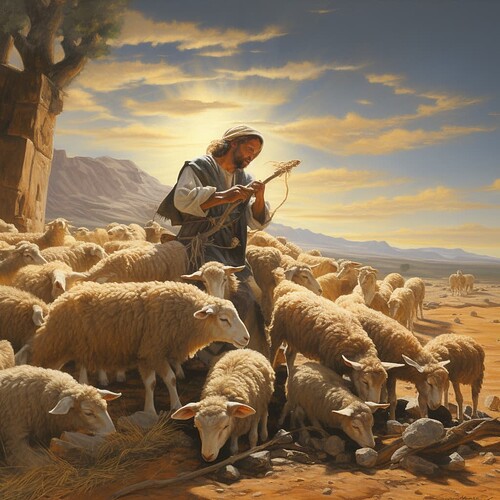![]() January 17: Genesis 30 - The Struggles and Faith of Jacob’s Family
January 17: Genesis 30 - The Struggles and Faith of Jacob’s Family
Navigating Family Dynamics and Trusting God’s Plans
 Introduction
Introduction
Our journey through the book of Genesis brings us to chapter 30 on January 17th. In this chapter, we witness the complex dynamics of Jacob’s family, the struggles for identity and blessing, and the unfolding of God’s plans amidst human imperfections.
 Genesis 30: Jacob’s Growing Family
Genesis 30: Jacob’s Growing Family
Genesis 30 continues the saga of Jacob’s family. It details the birth of several of his children through Leah, Rachel, and their maidservants. Amidst these narratives are themes of rivalry, desire for recognition, and the quest for God’s blessings.
Key Verse: “Then God remembered Rachel; he listened to her and enabled her to conceive.” — Genesis 30:22
 Key Themes and Reflections:
Key Themes and Reflections:
Family Rivalry and Human Desires: The chapter vividly portrays the rivalry between Leah and Rachel, reflecting the complexities of human desires and relationships.
God’s Providential Care: Despite human failings and manipulations, God’s care and providence are evident in the growth and protection of Jacob’s family.
The Power of Prayer: Rachel’s story highlights the power of prayer and the significance of waiting for God’s timing in our lives.
 Today’s Application:
Today’s Application:
Reflect on how personal struggles and family dynamics can be intertwined with God’s plans. Consider how to navigate complex relationships with faith and integrity. Embrace the power of prayer in your life, especially in times of waiting and longing.
 Hidden Gem:
Hidden Gem:
Did you know? The various names given to Jacob’s sons have significant meanings, reflecting the circumstances of their births and the aspirations of their mothers. These names are a window into the family’s story and God’s unfolding plan.
 Reflective Q&A:
Reflective Q&A:
![]() Genesis 30: Family and Faith
Genesis 30: Family and Faith
![]() Navigating Family Struggles: How can we find strength and guidance in God amidst family rivalries and struggles?
Navigating Family Struggles: How can we find strength and guidance in God amidst family rivalries and struggles?
A: By seeking God’s wisdom and practicing patience and forgiveness, we can navigate family struggles, allowing God’s grace to work through our relationships.
![]() Trusting in God’s Timing: What can we learn from Rachel’s experience about the importance of trusting in God’s timing?
Trusting in God’s Timing: What can we learn from Rachel’s experience about the importance of trusting in God’s timing?
A: Rachel’s experience teaches us that even in the midst of longing and disappointment, trusting in God’s timing brings fulfillment and aligns our lives with His greater plan.
 Join the Discussion:
Join the Discussion:
Share how Genesis 30 speaks to you about handling complex family dynamics and maintaining faith in God’s providence. Join the conversation in the comments.
#Genesis30 #FamilyDynamics #Prayer #GodsTiming #BibleStudy #SpiritualGrowth
![]() Explore More in Genesis: Join us tomorrow as we continue to uncover the rich lessons in the lives of the patriarchs.
Explore More in Genesis: Join us tomorrow as we continue to uncover the rich lessons in the lives of the patriarchs.
 Join the forum!
Join the forum!
Deepen your biblical understanding with our AIgniteScripture Community:
Free Members: Participate in engaging discussions and explore comprehensive biblical resources. Sign up here: 🌟 How to Join Page - Membership Options
Supporters Membership ($20/month or $200/year): Gain deeper insights with exclusive content, newsletters, and a community of support. Join as a Supporter: 🌟 How to Join Page - Membership Options
![]() Stay Updated with our AIgniteScripture Newsletter: Follow our daily readings and insights. Subscribe for enriching perspectives: https://newsletter.aignitescripture.com/
Stay Updated with our AIgniteScripture Newsletter: Follow our daily readings and insights. Subscribe for enriching perspectives: https://newsletter.aignitescripture.com/
